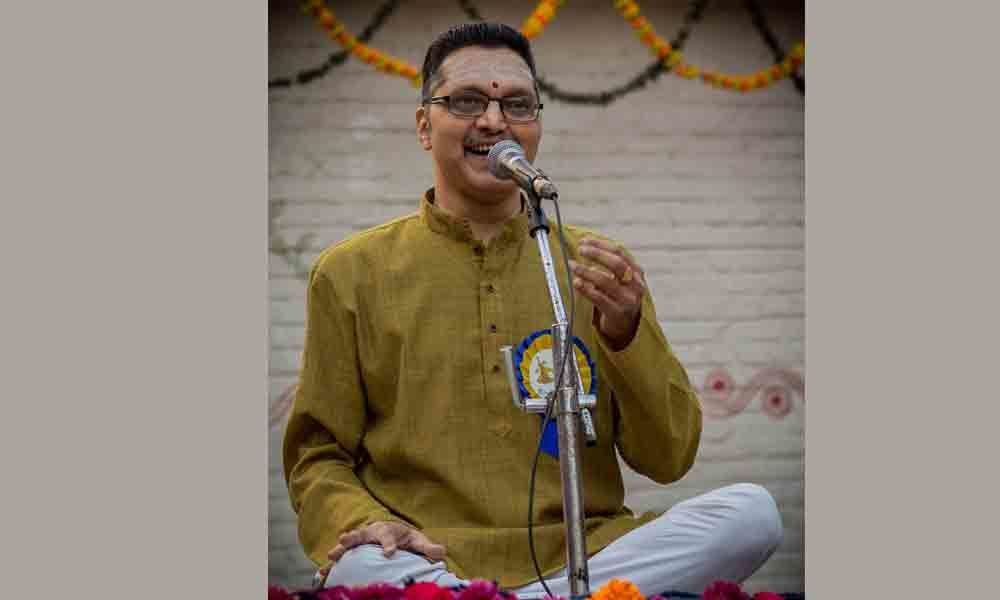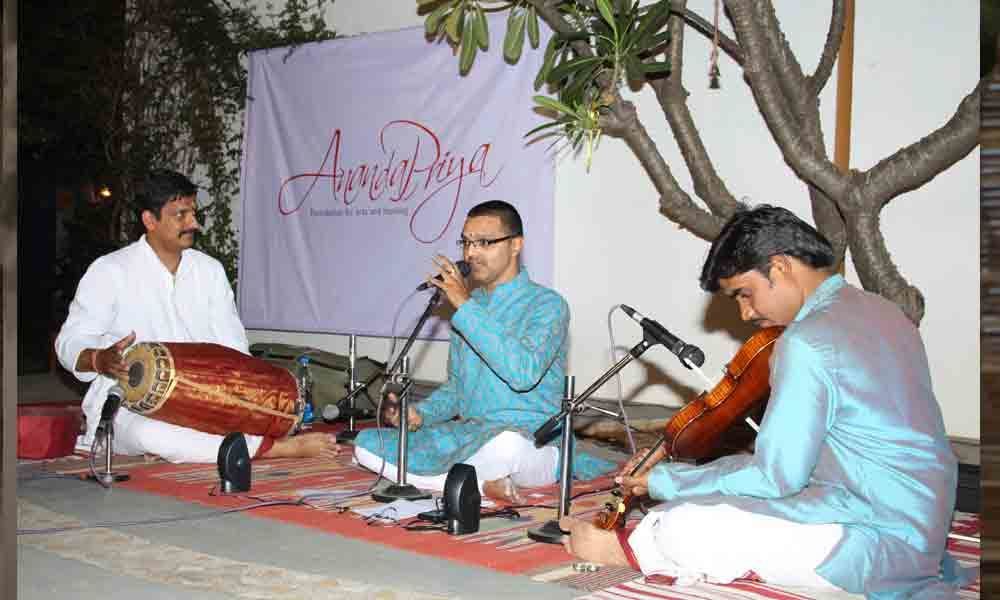Live
- Apple Removes WhatsApp and Threads from its Store in China; Details
- Amid flood of complaints, 50.96 pc turnout in Bengal's three LS seats till 1 pm
- BJP expecting its 'best show in South' on back of PM Modi's popularity, says HM Amit Shah
- Mahabubnagar MP Seat Witnesses Intense Competition among Congress, BJP, and BRS Candidates
- 150 Families from YSRCP Join TDP in Tanakallu Mandal
- Special prayers offered at Dargah during Keshineni Chinni's Nomination
- Dell launches AI-powered commercial PC portfolio in India
- Maha: 5 Vidarbha constituencies records 32.36 pc polling till 1 pm
- Congress, CPI-M not part of INDIA bloc in Bengal: Mamata Banerjee
- Madhubani Saree: The epitome of traditional elegance and modern beauty
Just In
"My throat is gone. Bad cold. I can't even utter a few words…don't know how am going to sing…" these words had come out in a croak as we had gone to meet him behind the curtains. The evening was serene.
The atmosphere electric with expectation. As the concert began, the musical notes that cascaded from his voice left the audience spell-bound. His rendition of Kalyani raga RTP (Ragam Taanam Pallavi) that took a good one hour gave him another one of those thunderous applauses.
After all, it wasn't the first time it happened to Carnatic vocal maestro Sathiraju Venumadhav, who had comfortably tucked in 2,000 or more such performances under his belt. Difficult to assimilate the fact that he is no more…
Venumadhav started singing when he was six having learnt from his grandmother Sathiraju Maruti Rajyalakshmi….and gave his first concert in Guntur in 1986. As a young artist he received much praise and appreciation.
In his formative years, music became his quest. "There was nothing else for me. I could dream, eat and sleep, music. It had become such as obsession that I would search for musical notes all around me. Even in vehicular sounds or chirping of birds, I would try to find notes and rhythm," he would chuckle.
He received advanced training from Sri Raghavachary and Sri Nedunuri Krishnamurthy. Both the illustrious Gurus helped him realise the deep workings of Manodharma.
What characterises his music? Venumadhav strove to give freshness to everything he sang. After he went to learn the finer nuances from Nedunuri Krishnamurthy, there was further evolution. "I learnt how to refine the sangathis. Gurugaru taught me how to view a raga as a whole, from the top and understand its core being before one used it in compositions. For the first time, I learnt that sometimes too many Gamakas are not necessary. Sometimes, the reverse was true. It was important to study the lyrics carefully before. For Kirthanas, I believe that Alapana and Swarakalpana would give it the density while Krutis needed a more subtle approach. I tried this method while tuning Annamacharya compositions. So, that both musicians and music enthusiasts (less formal singers) can enjoy singing these with ease and joy."
Then there was the usage of rare ragas in his compositions. "Using these rare ragas gives you an opportunity for the right expression of Bhava. I also believe that the vast amount of our treasured knowledge of ragas is vanishing and many exponents sing only popular ragas in the hope of connecting with the audiences better. But I fear these rare diamonds might get lost in time. So, I tried to compose Annamayya Kirthanas (previously not tuned by anyone) in as many rare ragas as possible. This experiment was received very well too."
Another outstanding feature of his concerts was his attention to the literary content of the compositions. "I have heard so many great maestros. However, somewhere down the line, we had lost the proper enunciation of those beautiful, delicate Telugu words…best example is... 'Prakala nelabadi' – the Tygaraja's kirthana. In my concerts, I had tried to remedy this."
How did he tune hitherto unheard 108 Annamachary's compositions? The process?
Venumadhav was never the type of an artist, who sat at a Tampura for hours for inspiration. He carried his work wherever he went. Sometimes, he would continue tuning on bus rides (his fellow passengers looked on amused) train rides, long drives or even sometimes he would wake up in the middle of the night and complete the tuning. "Sometimes, the tune for a particular lyric would come to me in a dream-like state. I would immediately wake up and start writing the notation to it lest I forgot it by morning."
When Ramakanth, my best friend Priya, and I decided to start Anandapriya Foundation, to create a platform for classical arts, he (Venumadhav) encouraged us and agreed to give its maiden performance. No one could forget his rendition of Nagumomu - tyaraja kirthana that day!
He had high personal standards. He would politely decline to sing in places he didn't like. Sometimes he agreed to sing in a small temple outside of town.
As a person, teacher, friend, he was a fine human being. Gentle, smiling, his eyes always twinkling, Venumadhav was always ready for a laugh. Despite the many challenges both health and work-wise, he never let any sadness settle on himself. He was a true inspiration!
We will miss him deeply…
-This short piece has been put together from memory of various conversations with Sathiraju Venumadhav. The writer was his student.

© 2024 Hyderabad Media House Limited/The Hans India. All rights reserved. Powered by hocalwire.com









